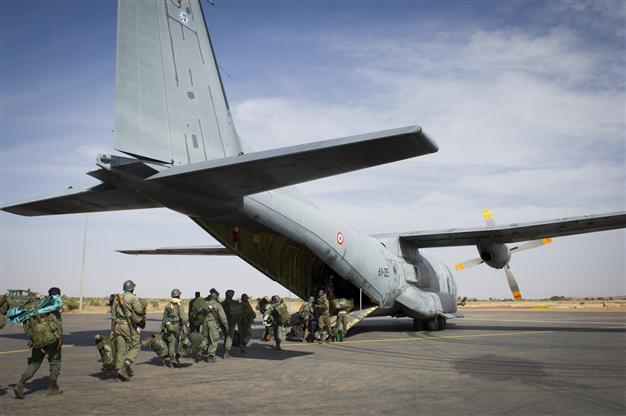French-led troops ring Timbuktu, Islamists burn manuscripts
PARIS - Agence France-Presse

AFP Photo
French-led troops ringed Mali's fabled desert city of Timbuktu Monday after seizing its airport in a lightning advance as fleeing Islamists torched a building housing priceless ancient manuscripts.
French paratroopers swooped in to try to block fleeing hardliners as ground troops coming from the south seized the airport in the ancient city which has been one of the bastions of the extremists controlling the north for 10 months.
"We control the airport at Timbuktu," a senior officer with the Malian army told AFP. "We did not encounter any resistance." French army spokesman Colonel Thierry Burkhard told AFP the troops, backed up by helicopters, had seized control of the so-called Niger Loop -- the area alongside the curve of the Niger River flowing between Timbuktu and Gao -- in less than 48 hours.
A fabled caravan town on the edge of the Sahara desert, Timbuktu was for centuries a key centre of Islamic learning and has become a byword for exotic remoteness in the Western imagination.
The once cosmopolitan town became a dusty outpost for the extremists who forced women to wear veils, whipped and stoned those who violated their version of strict Islamic law, and destroyed ancient Muslim shrines they considered "idolatrous".
But reports emerged that the hardliners had wreaked mayhem before escaping, burning the Ahmed Baba Centre for Documentation and Research which housed between 60,000 and 100,000 manuscripts from the ancient Muslim world and Greece, according to Mali's culture ministry.
'What happened in Timbuktu was dramatic ' Timbuktu mayor Halley Ousmane, who is in Bamako, confirmed the destruction saying: "I spoke to my media officer this morning. What has happened in Timbuktu is dramatic." The institute was set up in 1973. In 2009, a new building was opened following a bilateral agreement with South Africa to promote the conservation, research and promotion of the manuscripts as African heritage.
"A building housing the manuscripts was burned," a security source told AFP. The information was confirmed by a Malian soldier forming part of a reconnaissance team in the town, which has been surrounded by the French-led forces.
The advance into Timbuktu known as "the City of 333 Saints", which lies 1,000 kilometres (600 miles) north of Mali's capital Bamako, comes a day after French and Malian soldiers seized another Islamist bastion, the eastern town of Gao.
The French defence ministry said a French armoured battalion, Malian troops and soldiers from Niger and Chad were in control of Gao after fighting Saturday in which "several terrorist groups were destroyed or chased to the north".
Gao is the biggest of six towns seized by French and Malian troops since they launched their offensive on January 11 to wrest the vast desert north from the Islamists.
The largest town yet to be recaptured is Kidal further north near the Algerian border which was the first to be seized by an alliance of Tuareg rebels and Islamic extremists last year.
Mali's lengthy crisis was kickstarted by a Tuareg rebellion for independence in January last year which overwhelmed the weak Malian army and prompted a coup in Bamako in March.
Amid the political vacuum the Tuareg desert nomads and Islamists seized the north in a matter of days. But the extremists had no interest in the Tuareg desire for independence and quickly sidelined their erstwhile allies to install sharia law.
The occupation of an area twice the size of France sparked fears abroad that northern Mali could become a new haven for terror groups, threatening the West as well as neighbouring African countries.
However plans to intervene remained mired in hesitation.
In early January the Islamists broke through into the government-held south, raising fears that the Islamists could seize the capital Bamako and prompting intervention by former colonial power France.
There have been reports of reprisal attacks and the killing of Tuaregs, a Berber people, and Arabs leading the rebellion against Bamako by Malian soldiers and the local people.
"We have already witnessed reprisals ... and thousands of people going into exile fearing for their lives," said Corinne Dufka, a researcher from Human Rights Watch, urging immediate action from authorities to lower tensions.
Defence chiefs from West African regional grouping ECOWAS agreed Saturday to boost their troop
pledges for Mali to 5,700. Chad, which is not a member of the 15-nation bloc, has promised an extra 2,000 soldiers.
France said Sunday it had now deployed 2,900 troops and that 2,700 African soldiers were on the ground in Mali and Niger, but French Prime Minister Jean-Marc Ayrault appealed for more aid for the Mali effort.
